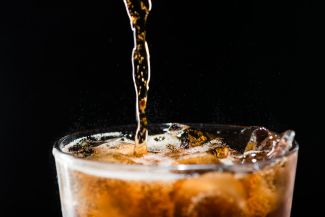Does Diet Soft Drinks Cause Cancer
Does Diet Soda Cause Cancer?
Image

Sugar-sweetened beverages such as soda, sweet tea, lemonade and sweetened coffee beverages lead to excess added sugar in the diet, which may lead to weight gain. Overweight and obesity increase the risk of a variety of chronic health conditions, including type 2 diabetes, heart disease and certain cancers, including breast and colorectal cancer. That's why the American Institute for Cancer Research recommends limiting added sugar and sugary beverages in your diet.
If you drink sugary sodas on a regular basis and want to cut back on your added sugar intake, you may wonder whether diet sodas are a healthy alternative. Diet sodas contain no calories or sugar, but they do contain low-calorie sweeteners — for example, aspartame, sucralose, or saccharin – which are also called sugar substitutes, artificial sweeteners or non-nutritive sweeteners. Many studies show that, compared with regular sodas, diet sodas that contain no sugar or calories are associated with reduced calorie intake and less weight gain. However, other studies show no difference in weight gain or calorie intake, and some even show the opposite effect.
Our brains respond to sweetness with increased appetite and cravings for more sweet foods, which can lead to excess calorie intake and weight gain. But it's hard to produce convincing evidence, because many of the studies on this topic are small and short-term.
Many low-calorie sweeteners have been studied extensively to determine their effects on health. While there were early concerns that artificial sweeteners might increase the risk of cancer, over time, results from additional research have not provided any clear evidence of a link.
Not All Low-Calorie Sweeteners Are Alike
Let's take a closer look at a few specific low-calorie sweeteners:
- Aspartame (NutraSweet® and Equal®) — Concerns about aspartame and cancer risk have been around for many years. Some of those concerns stem from a study in rats that found that very high doses of aspartame might cause lymphoma and leukemia. However, the study was found to have many shortcomings and has since been discredited. Studies of possible links between aspartame and cancer in groups of people (epidemiologic studies) have not been consistent. Aspartame is one of the most extensively studied ingredients in our food supply, with more than 100 studies supporting its safety. But it should be noted that aspartame has been linked to other side effects, such as headaches and migraines in some adults and children.
- Sucralose (Splenda®) — Like aspartame, sucralose has been studied thoroughly. The FDA has reviewed more than 110 studies confirming the safety of sucralose as a general-purpose sweetener in food.
- Saccharin (Sweet and Low®, Sweet Twin®, Sweet'N Low®, and Necta Sweet®) – While early animal studies linked saccharin with the development of bladder cancer, further studies have shown that those results apply only to rats, and that the mechanism that caused the bladder tumors is not applicable to humans. Human-based studies show that saccharin intake is safe.
- Steviol Glycosides (stevia) and Luo Han Guo Extract (monk fruit) — Unlike the artificial sweeteners above, these ingredients are extracted from plants found in nature. They do not have any calories and are beginning to be used more frequently in a variety of foods and beverages. They are generally recognized as safe, but have not been studied as extensively as the other sweeteners listed above.
- Sugar Alcohols (sorbitol, xylitol, lactitol, mannitol, erythritol, maltitol) — These are not classified as low-calorie sweeteners, but they have slightly fewer calories than table sugar. While all of the other sweeteners listed above are actually several times sweeter than table sugar, sugar alcohols are slightly less sweet. They do not cause sharp rises in blood glucose as table sugar can, and are often found in sugar-free candies, cookies, ice cream, beverages and chewing gums. Large amounts of sugar alcohols may cause diarrhea in some people.
Nutrition and Cancer
Get tips on other nutrition choices that can lower your cancer risk.
Learn More
The bottom line is that there is no strong evidence directly linking intake of sugar or low-calorie sweeteners to cancer risk. However, cutting back on or avoiding soda altogether may have positive effects on your health.
For adults trying to reduce or eliminate their intake of sugary soda, diet soda is a possible short-term substitute. Just remember that it's best to drink it in small amounts, and don't drink it often. In the same way, flavored coffee drinks, sweet teas, energy drinks, lemonade and juice drinks also contain a lot of added sugar and should be not be consumed frequently. If you're looking for a truly healthy alternative to sugar-sweetened sodas, quench your thirst with water (plain, sparkling or infused with berries, cucumbers or mint) or unsweetened tea or coffee.
Does Diet Soft Drinks Cause Cancer
Source: https://www.roswellpark.org/cancertalk/202003/does-diet-soda-cause-cancer#:~:text=The%20bottom%20line%20is%20that,positive%20effects%20on%20your%20health.